Training your body and mind is crucial to stay healthy and spirited.
Why are training body and mind important? We live in a time of significant changes; if we want to be in flow with them and reach our desired goals, it is more than ever necessary to take care of ourselves. We need the right knowledge, but caring for our health, body, and mind is also essential.
Some may want to sit back and let AI and robots do our work. We can let our minds atrophy, or we take care of our infinite advanced abilities and stay spirited and creative and use the new technology instead.
We do not have to become like Superman or Superwoman, as we are already Superhuman, but we should keep ourselves flexible in body and mind.
Josef Pilates said: “To achieve the highest accomplishments within the scope of our capabilities in all walks of life, we must constantly strive to acquire strong, healthy bodies and develop our minds to the limits of our ability.”
He knew it was possible, as you will see if you read his story below.
Do you know how sports and the psyche are related?
We know that regular exercise has a decisive influence on our physical health. However, we often underestimate the connection between physical activity and mental health. Especially when it comes to sports at home, we may neglect this aspect.
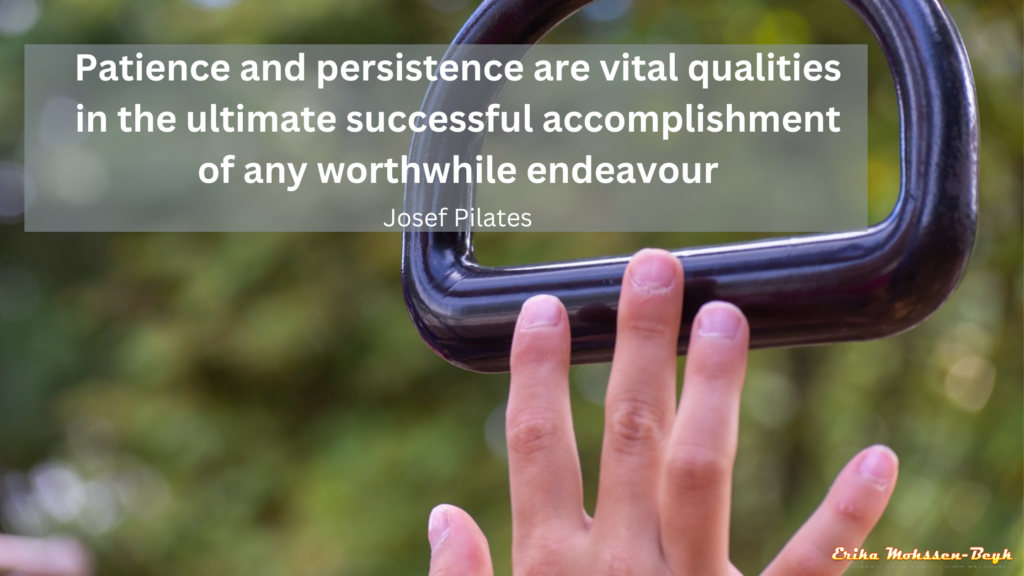
“Patience and persistence are vital qualities in the ultimate successful accomplishment of any worthwhile endeavor.” — Joseph Pilates.
Scientific studies have proven that physical activity positively impacts emotional health. But how does regular exercise affect our mental health in detail?
For effective stress management: Continuous physical or emotional stress can ensure that we produce too much of the stress hormone cortisol. The pandemic and the ongoing uncertainty in the lockdown are already making it clear that many suffer from stress, difficulty concentrating, or weight gain. A balance with sport is now more critical! Avoid high-intensity training, which increases the release of stress hormones. Instead, you can insert holistic training, yoga, and meditation that bring peace and balance.
Better sleep: An increased cortisol level also causes problems because our bodies produce too little melatonin. It’s a vicious circle: If we sleep too little or not well, we are less concentrated, weak, and irritable, increasing our cortisol levels even further.
One of the most established anti-stress strategies is exercise because 20 to 30 minutes of exercise a day helps reduce stress.
For improved well-being: For people suffering from depression, exercise can have a mood-enhancing effect because the body releases happiness hormones such as dopamine, serotonin, and endorphins during sports.
Sport works like a “natural antidepressant,” physical activity can alleviate symptoms such as fatigue, trouble concentrating, or even anxiety and improve overall well-being.
However, if you notice symptoms, you better seek help because depression is a severe illness.
Strengthens self-esteem: Self-esteem also improves through sport. Studies say regular exercise and gradually enhancing fitness increase our confidence and self-worth.
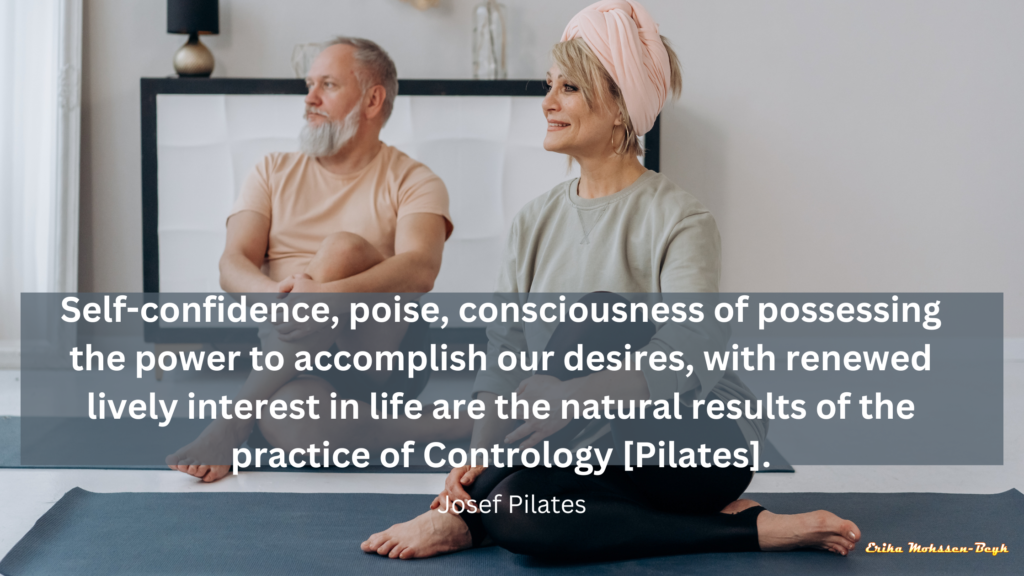
“Self-confidence, poise, consciousness of possessing the power to accomplish our desires, with renewed lively interest in life are the natural results of the practice of Contrology [Pilates].” — Joseph Pilates
Here is Josef Pilates’s story
I remember talking about pilates exercises to some young friends who dreamed about six-pack abs. One said Pilates is only for girls, not men.
But if we see what Josef Pilates accomplished, it is better to start slowly (like a girl?) than not at all.
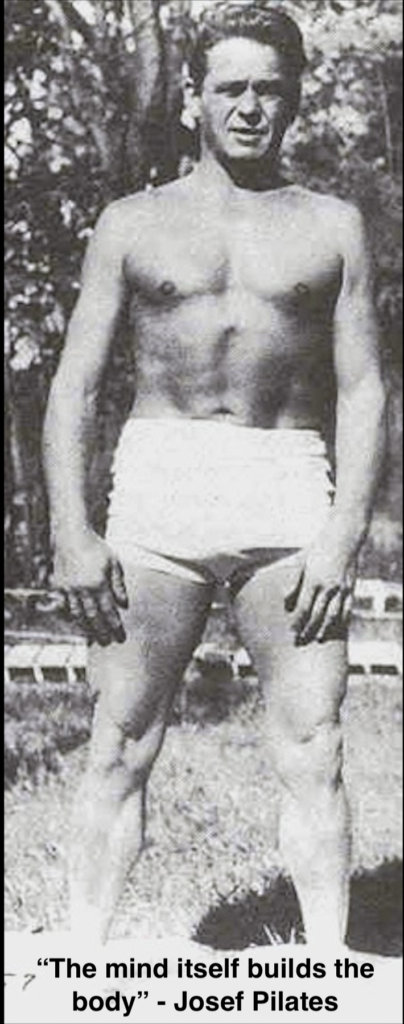
He has revolutionized the perception of health and fitness from a young, sickly boy to influencing a multi-million-dollar industry today.
Joseph Hubertus Pilates was one of ten children born to Anna Hahn and Heinrich Friedrich Pilates on December 9, 1883, in Germany. His mother was a factory worker, and his father was a locksmith and mechanic in a factory.
Joseph’s childhood was chaotic, as his family frequently moved from one house to another. He was a frail child, suffering from asthma, rickets, and rheumatic fever. When he was five years old and ready to attend School, his family had moved four times.
Joseph Pilates did not feel comfortable at School.
The frequent moves prevented him from feeling at home in a class or building relationships with his schoolmates. He often sat down instead to play in the schoolyard with the other children and watched them. The games of his contemporaries did not inspire him.
Other children bullied him. In one incident, he was pelted with stones by a group of boys and lost sight in his right eye. When it got too much for him, Joseph went to the forest instead of the School.
Observing animals in nature
Joseph often preferred spending time alone, roaming the woods, and observing cats and other animals in nature. He enjoyed leaving the stench of garbage and horse droppings hanging over the city behind. The boy liked the silence and stepped out of town into the forest. He loved the sounds of the forest, the creaking of the branches, the rustling of small animals in the underwood, and the different smells depending on the season. But most he likes to watch the animals in the forest. Whenever he saw an animal, he followed, fascinated by its movements.
He spotted squirrels, rabbits, foxes, and birds: jays, wood pigeons, blackbirds, and woodpeckers. He looked after the animals and could stare at them intently for hours. The tension of the whole body when a squirrel started to jump, how far it could jump, and how precisely it reached its target. He admired how easily they stretched, how they were one with their bodies.
“As a child, I would lie in the woods for hours, hiding and watching the animals move, how the mother taught the young,” he said.
An enthusiastic gymnast
A comparable joy to that of his secret excursions Joseph Pilates only felt during gymnastics. When his father, an enthusiastic gymnast, took him to the gymnastics club at an early age.
He began to dedicate his life to well-being and becoming physically stronger. A family doctor had noticed the serious boy with bright eyes. He brought the boy an old anatomy book, and Joseph devoured this book.
When Joseph turned 13, 14 years old, his tireless practice and spirit showed a slow effect. Gymnastics, boxing, and strength training transformed the weak, slender child into a strong young man.
He experienced what one could achieve with determination, targeted exercises, and how to use his intuitive understanding of the body to get strong.
Joseph Pilates developed his work from personal experience. While developing his method, he studied anatomy and many kinds of self-improvement systems. He also looked into Eastern practices like Zen Buddhism and Yoga and was inspired by the body, mind, and spiritual development.

Model for anatomical charts
By the age of 14, he was fit enough to be a model for anatomical charts because of his training in gymnastics and bodybuilding.
Did you know he was an accomplished boxer, skier, gymnast, and even at yoga?
Joseph believed the roots of poor health come from poor breathing and lousy posture.
In 1912 he moved to England and worked as a boxer, circus performer, detective, and self-defense trainer.
During World War I, Josef was sent to a camp in Lancaster where he trained inmates in health and fitness, and this was the beginning of the Pilates exercise. The movements can be small and therapeutic and designed to help people to recover from injuries, or they can be challenging, even for athletes.
The very first Pilates students have been patients. Joseph Pilates was working as a post-World War nurse. He developed this method for helping the patients strengthen their stabilizer muscle which is supposed to support the spinal column. And he also taught deep and regular breathing during the exercise.
In 1925 Joseph Pilates migrated to the U.S. On the ship, he met his future wife, Clara. In New York City, they began a studio and taught students; most of his students were dancers and movie stars.
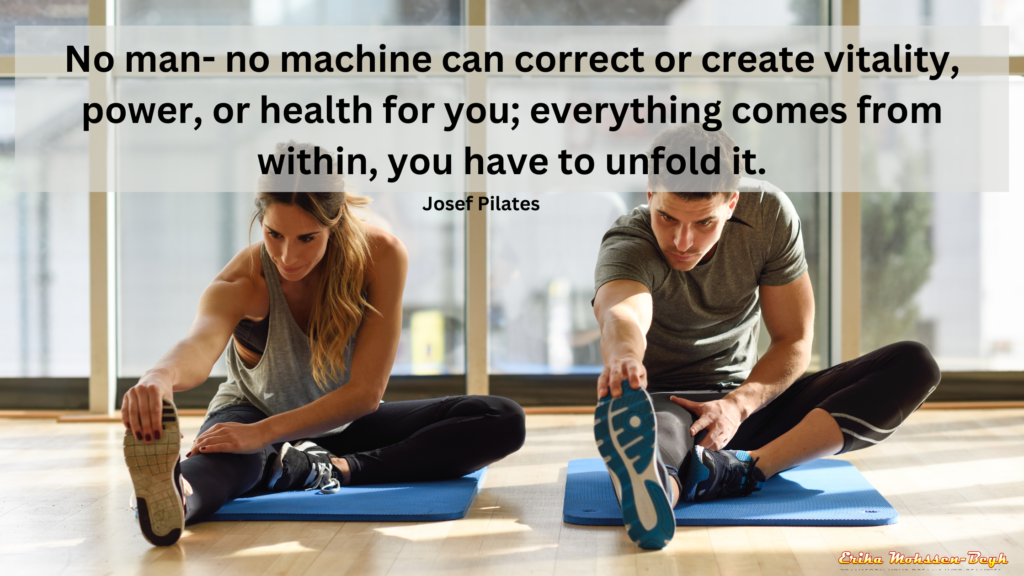
“No man- no machine can correct or create vitality, power, or health for you; everything comes from within, you have to unfold it.” – Joseph Pilates.
Pilates exercise
Pilates exercise uses the mind to control the muscles of the body. It focuses on the core muscles of the belly muscles to keep the body balanced. If the body is in balance, it supports the spine. Awareness of breathing, and alignment of the spine for stronger torso muscles, is what he was teaching. Pilates involves inhaling through the nose. Exhale through the mouth into the chest, the so-called “powerhouse.”
Joseph Pilates has revolutionized the perception of health and fitness from a young, sickly boy to influencing a multi-million-dollar industry today.
The practice of Pilates is undoubtedly one of the most popular exercises today. Millions of people follow his practice and credit it to transforming their health, fitness, and lifestyle. The number of Americans who regularly practice it has exploded over sixfold from 1991 to 2005 (from 1.7 million to 11 million).
He also wrote a first book > “Your Health.” There are more here.
“The man who uses intelligence with respect to his diet, his sleeping habits and who exercises properly, is beyond any question of doubt taking the very best preventive medicines provided so freely and abundantly by nature.” — Joseph Pilates.
Start exercising
Take a deep breath, listen to yourself, and train your muscles and mind. Yoga and Pilates complement each other very well; combining them results in a perfect workout that leads to more body tension and serenity. Apart from some differences, there are many similarities between Yoga and Pilates, which can increase well-being so that you can achieve your desired goals more quickly, especially if you combine it with meditation practice.
See> Difference Between Pilates and Yoga.
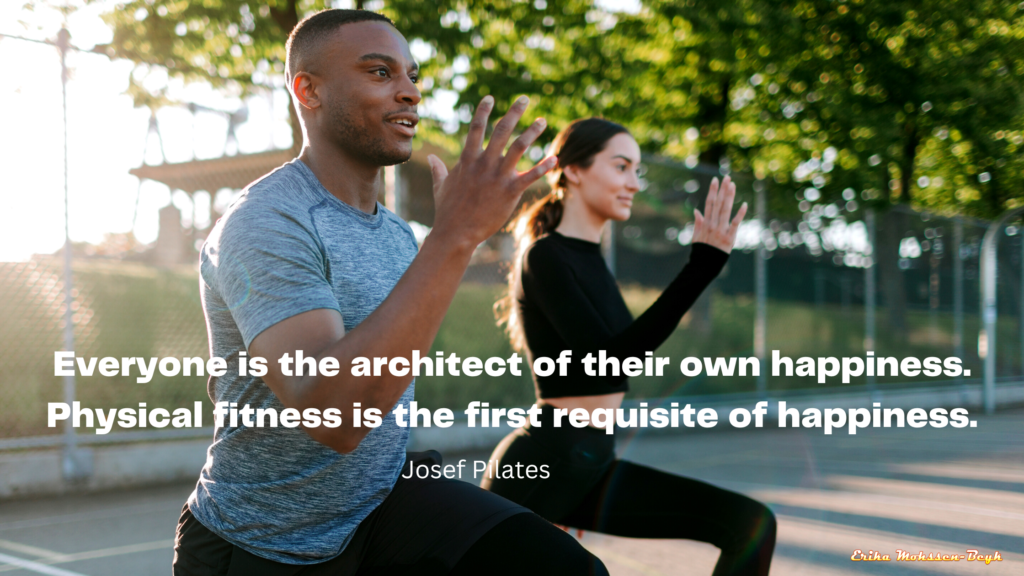
“Change happens through movement, and movement heals.” — Joseph Pilates.
Every moment of our life can be the beginning of great things. — Joseph Pilates.

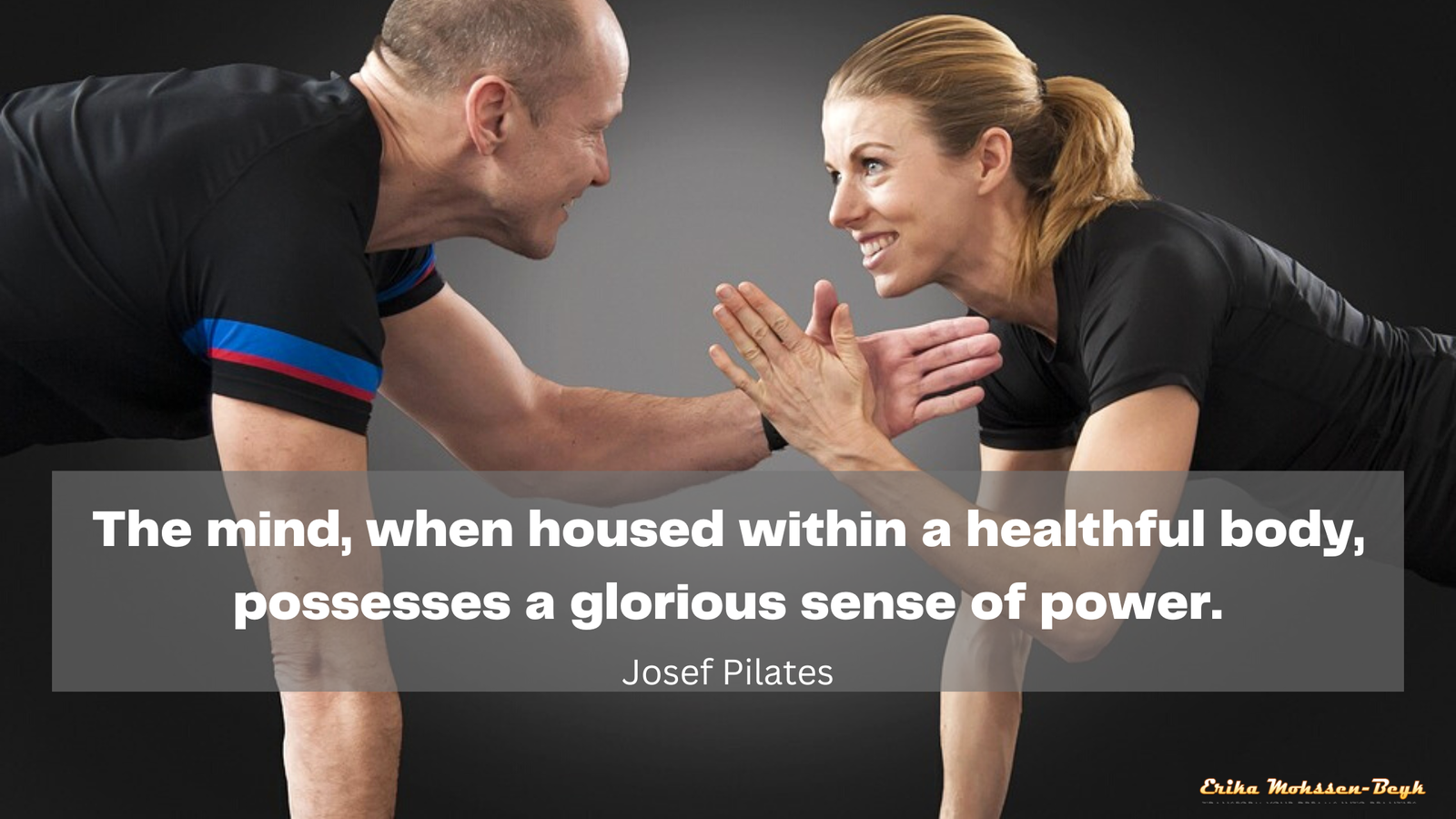
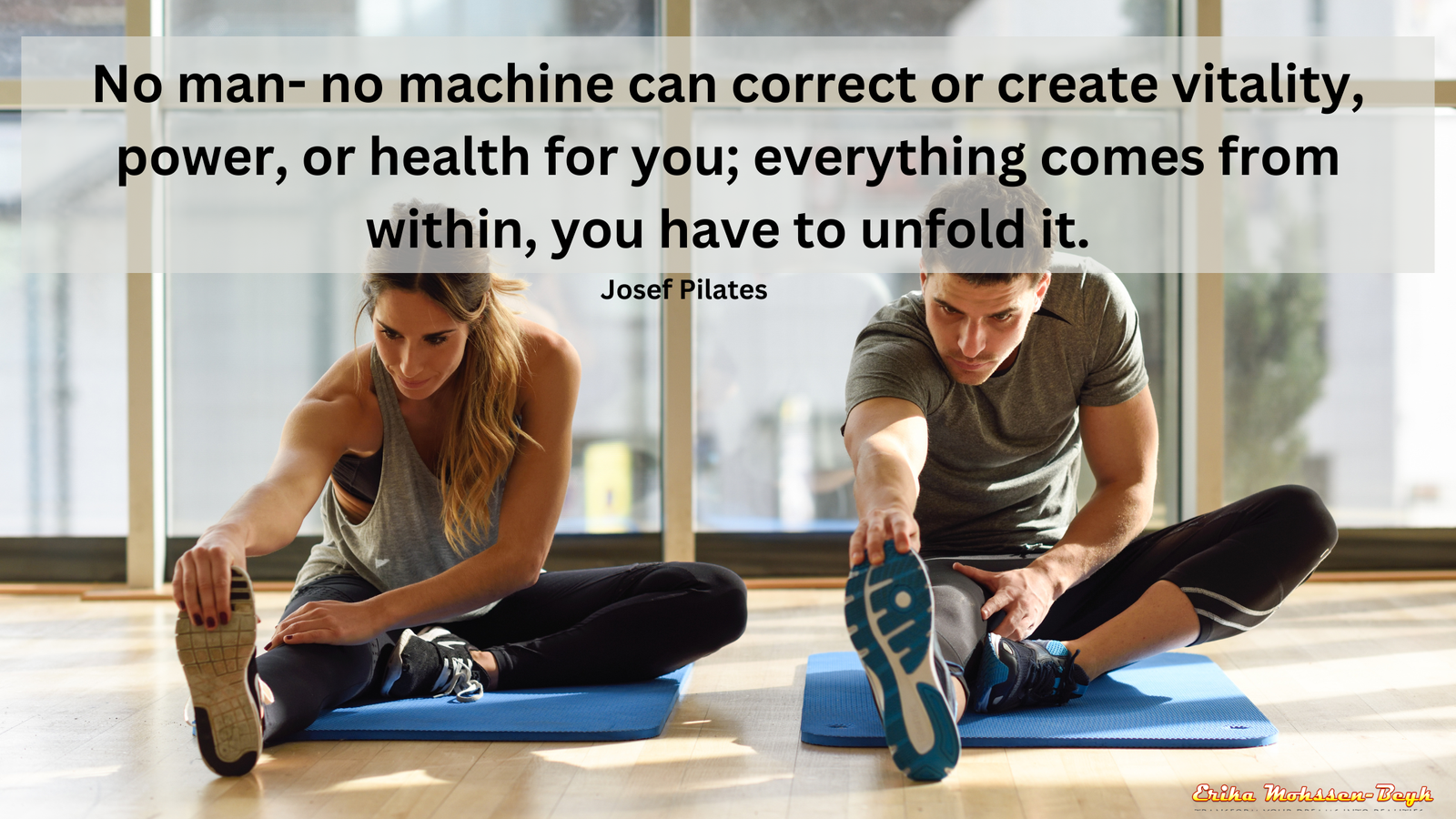






Hi Erikamohssen-beyk!
I really enjoyed reading your post about how training your body and mind can help you to achieve your desires. It’s such an inspiring read and it has shown me that with dedication, hard work and determination, anything is possible. It has motivated me to start training both my body and mind and I’m sure I will see the results soon! Thanks for the great post!
Hi Aadiv,
I am glad that you are motivated to do more for your body and mind. It will help you to reach your desire and goals.
To your desired results, thank you
Erika
Erika Mohssen-Beyk recently posted…Do You Lose Yourself in the Past and Future?
Pilates was a genius because he observed the spirit and behavior of animals. Watching their mind-movement gives human beings a good mental and body example to follow. This is why Bruce Lee taught how we need to be like water. This is also why I do Kriya yoga tensing and yin yoga daily for the past 6 years. Yoga opens the mind and body, to be as Spirit is….and to be as animals are. Fab post!
Ryan Biddulph recently posted…8 Glaring Guest Blogging Errors
Yes, Ryan, this is what I liked about Pilates; he learned from nature. The movements are very close to Kriya Yoga. I created and used to teach for 18 years, a combination of the two as a mindful exercise. You could feel the change of mind, body, and spirit after each session. And as Bruce Lee said, being like water is what we should always remember. Like water, we can always find a way. Unfortunately, in our time, people seem to be too far from nature. We need more “back to nature.” Thank you for your comment.
Erika
Training both your body and mind is essential to achieving your desires and living a fulfilling life. When you focus on strengthening your body through exercise and proper nutrition, you not only improve your physical health but also your mental health. Exercise releases endorphins, which can boost your mood and reduce stress, anxiety, and depression. Proper nutrition provides your body with the fuel it needs to function at its best and can help reduce the risk of chronic illnesses.
Cynthia Trent recently posted…WHEN DID I FALL IN LOVE WTH CHIROPRACTIC
Hi Cynthia,
Right, it is not only what we eat, but we also need to move and train our bodies. It will also benefit our mental health and attitude toward life.
Thank you
Erika